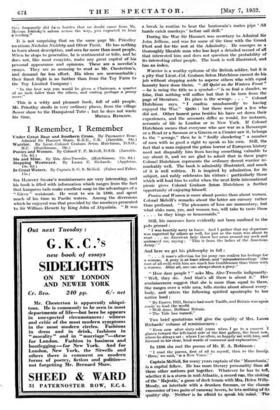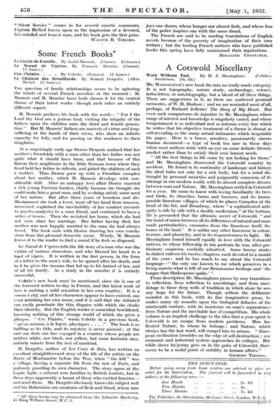I Remember, I Remember
Ponies and Women. By Colonel T. P. Melvill, D.S.O. (Jarrolds. 12a. 6d.) SIR HAMNET SHARE'S reminiscences are very interesting, and his book is filled with information which ranges from the fact that kangaroo tails make excellent soup to the advantages of a " Gieve " waistcoat. He went to sea in 1880, and spent much of his time in Pacific waters. Among the diversions which he enjoyed was that provided by the monkeys presented to Sir William Hewett by King John of Abyssinia. "It was
a break in routine to hear the boatswain's mates pipe ' All hands catch monkeys ' before sail drill."
During the War Sir Hamnet was secretary to Admiral Sir John Jellieoe, and was for some of the time with the Grand Fleet and for-the rest at the Admiralty. He emerges as a thoroughly likeable man who has kept a detailed record of all that interested him and does not question the probability of its interesting other people. The book is well illustrated, and has an index.
Warrior is a worthy epitome of the British soldier, but it is a pity ttu1t Lieut.-Col. Graham Seton Hutchison cannot do his job without stepping aside to asperse others who with equal honesty have done theirs. "All Quiet on the Western Front'''. —he is using the title as a symbol—" is so foul a slander, so false, that nothing will suffice but that it be torn from the page of literature. Its place is the sewage. . . . " Colonel Hutchison says, " I confess unashamedly to having enjoyed the War." Quite : but there were just a few who did not. Other honest pens besides his have set down their experiences, and the accounts differ as would, for instance, accounts of life in London or in New York. If Colonel Hutchison means that everyone who saw war as a Remarque or a Read or a Sassoon or a Graves or a Crozier saw it, belongs to the " sewage," then he is " foully slandering " a number of men with as good a right to speak as his own. Still, the fact that a man enjoyed the prime horror of European history need not disqualify him from having something valuable to say about it, and we are glad to admit that in these pages Colonel Hutchison represents the ordinary decent warrior re: markably well. The book is admirably illustrated, and much of it is well written. It is inspired by admiration for its subject, and nobly celebrates his virtues : particularly those which will lead him to enlist when the next little international picnic gives Colonel Graham Seton Hutchison a further opportunity of enjoying himself.
Ponies and Women is more about ponies than about women. Colonel Melvill's remarks about the Tatter are cursory rather than profound. " The pleasures of love are momentary, but what risks men, yes, and women too, will take to taste them . . . . be they kings or housemaids."
Still, his successes have evidently not been confined to the polo ground :
I was heartily sorry to leave. And I gather that my departure was regretted by others as well, for just as the train was about tb start . . . an American lady threw her arms around my neck and embraced me, saying ; This is from the ladies of the American Army.' "
And here we get his philosophy in full :
. . . A man's affection for his pony can outlive his feelings for a woman. A pony is at least silent, and • misunderstandings ' (the root of all evil.) with him are much lees troublesome than those with a woman. After all, one can always shoot a pony."
" How dare people ? asks Mrs. Alec-Tweedie indignantly. " Well, they do. And that's all there is about it." Her reminiscences suggest that she is more than equal to them- She ranges over a wide area, tells stories about almost every- body, and utters the following spirited apostrophe to her native land :
" By Easter, 1932, Britain had made Tariffs, and Britain was again ready to lead the world.
"Well done, Brilliant Britain.
" The Tide has turned."
Two brief quotations will give the quality of Mrs. Laura Richards' volume of reminiscences :
" Even now after sixty-odd years when I go to a concert I glance toward the left-hand side of the first gallery, the front row, where he-always sat ; where I so often, so happily sat with him, sad listened to his dear, kind words of comment and explanation."
In 1896 she met the poems of Mr. E. A. Robinson :
" I read the poems, first of all to myself, then to the famili. ' Here,' we said, ' is a New Voice.' " Captain McNeil, for many years captain of the Mauretaniii,' is a capital fellow. He has more literary personality than alt these other authors put together. Whatever he has to tell, whether it is a storm in mid-Atlantic, a record run, the sinking of the Majestic,' a game of deck tennis with Mrs. Helen Willa- Moody, an interlude with a drunken fireman, or the chance encounter of two pairs of runaway lovers, he lets nothing-of rot its quality' slip. Neither is he afraid to speak his mind; -.Tie. " Silent Service " comes in for several caustic comments. Captain McNeil leaves upon us the impression of a devoted, fair-minded and honest 1118B, and his book gets the first prize.
• 'WALTER B. TIZZARD.







































 Previous page
Previous page